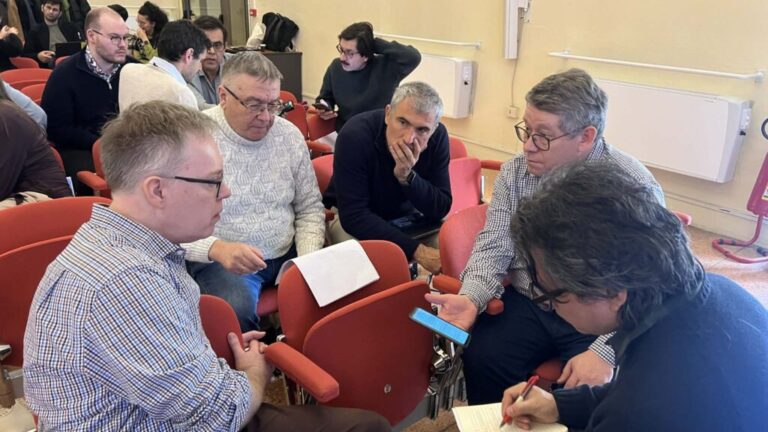
A significant new phase of the Italian FARMWISE case study is underway at Acqua Campus, where technicians from the experimental centre — together with Professor Agnieszka Medyńska-Juraszek from the University of Environmental and Life Sciences in Wrocław (UPWr), Poland — have launched a detailed investigation into the use of biochar in orchard systems.
This work represents an important milestone in FARMWISE’s ongoing effort to test nature-based, resource-efficient, and water-smart agricultural solutions under real field conditions.
 Field Trial in a Fuji Apple Orchard: Integrating Science and Practice
Field Trial in a Fuji Apple Orchard: Integrating Science and Practice
The latest activities took place in a Fuji apple orchard, where a structured field trial was initiated in April 2025. Biochar was incorporated along the tree rows with the dual aim of evaluating its:
- Agronomic performance
- Environmental impacts
To capture the full picture of how biochar interacts with orchard systems, the team combined:
- Comprehensive soil sampling
- An experimental fruit harvest, designed to assess effects on yield, fruit quality and productivity
- On-site measurements to document soil moisture and physical changes
This integrated approach allows the researchers to connect physico-chemical soil parameters with tangible agronomic outcomes, providing a robust evaluation of biochar’s effectiveness in orchard management.
 Laboratory Work and Cross-Country Collaboration
Laboratory Work and Cross-Country Collaboration
Soil samples collected from the orchard have been shipped to UPWr’s advanced laboratory facilities, where they will undergo detailed analysis in collaboration with Acqua Campus’ researchers.
A particular focus will be placed on:
- Changes in soil water retention capacity
- Soil structure and porosity
- Carbon dynamics and nutrient interactions
By combining laboratory precision with field-level measurements, FARMWISE is generating high-quality data that can support long-term modelling, scenario development, and evidence-based recommendations for Mediterranean and temperate orchard systems.
 What Is Biochar — and Why Does FARMWISE Study It?
What Is Biochar — and Why Does FARMWISE Study It?
Biochar is a carbon-rich material produced through the pyrolysis of residual plant biomass. Within FARMWISE, it is being investigated as a promising circular and climate-beneficial soil amendment because it can:
- Improve soil structure and water-holding capacity
- Increase organic matter content in degraded soils
- Help purify water through natural filtration properties
- Enhance soil fertility and root-zone stability
- Support carbon sequestration, locking carbon in the soil for decades
- Reinforce circularity by reusing agricultural waste materials
For regions facing water scarcity — including parts of Italy — biochar is an increasingly valuable tool for making soils more resilient to drought and less dependent on irrigation.
 Research Partners and Their Roles in FARMWISE
Research Partners and Their Roles in FARMWISE
Acqua Campus (Italy)
Acqua Campus is a leading experimental facility specialising in innovative irrigation, field experimentation, and water-saving technologies.
Within FARMWISE, it hosts the Italian living lab, offering real-world test sites where new soil and water innovations can be validated under authentic farming conditions.
University of Environmental and Life Sciences in Wrocław (UPWr, Poland)
UPWr contributes cutting-edge expertise in soil science, organic amendments, carbon cycling, and climate-smart land management.
Their laboratories support FARMWISE by analysing soil physical and chemical properties and assessing how innovations influence water availability, soil function, and long-term resilience.
Together, the organisations provide a model of scientific excellence + applied field expertise, ensuring that FARMWISE solutions are both innovative and practical.
 Why This Work Matters for FARMWISE
Why This Work Matters for FARMWISE
This activity is a core component of FARMWISE’s broader strategy to develop:
- Smart water management tools
- Circular soil solutions
- Evidence-based recommendations for farmers and regional authorities
- Resilience strategies that reflect Europe’s increasingly variable climate
The Italian biochar study offers real-world insights into:
- How soil amendments can support water-smart orchard systems
- The role of carbon-rich materials in improving soil function
- The potential for circular biomass use to reduce environmental impact
- How innovations behave under Mediterranean climate pressures
Results from this investigation will feed directly into FARMWISE’s cross-regional modelling and stakeholder tools, supporting better decisions for farmers, irrigation authorities, and policymakers.
 Next Steps
Next Steps
Over the coming months, UPWr will complete the laboratory analyses, and the FARMWISE team will integrate these findings with:
- Orchard productivity data
- Soil moisture records
- On-farm qualitative observations
A comprehensive summary will be made available through future FARMWISE publications, workshops and stakeholder engagement activities.


